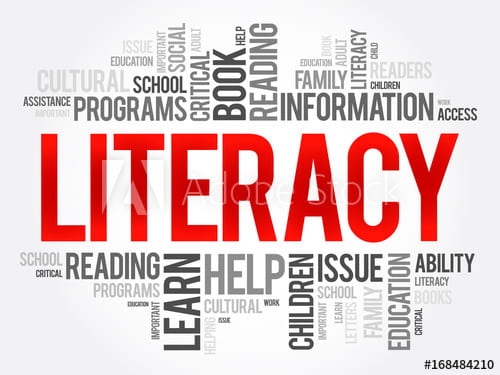The ability to seek, use and create information successfully is an imperative in this modern world. I have previously discussed this societal change and I have spent an inordinate amount of words prophesying the importance of fluency in information literacy (IL) to the point where I even wrote an essay on digital literacy, its impact on pedagogy and the role of a teacher librarian.
I thought I had exhausted this topic, but then it occurred to me that I have not reflected upon my own understanding of information literacy and how that impacts the role of a Teacher librarian.
Let us review what I have learned this semester… (briefly, I promise!)
- Society has evolved from product based to information based (Ricaurte, 2016) and people are not coping with this information overload (Thomas et al. 2016). Check out my amazing ‘Porridge pot’ analogy in Module 2.1
- Literacy levels are reducing (Lanning & Mallek, 2017).
- IL is poorly articulated and not embedded across national curriculum (Farmer, 2014; Lupton, 2014)
- …an attempt was made (Bonanno & Fitzgerald, 2014) but it was poorly planned and executed (Why not review my review of Lupton’s review 2014?).
- IL needs to be explicitly taught and assessed so that students see its value (Jacobson et al. 2018; Qayyum & Smith, 2018, p257; McGrew et al. 2018)… and please don’t say just do a research task and the skills will be accidentally learned. It won’t (McGrew et al. 2018).
- Evidence shows that Inquiry learning improves information literacy (Kuhlthau et al, 2012) as well as boosting…
- student motivation and self-regulation (Buchanan et al. 2016).
- Curriculum embedding of IL is important (McGrew et al. 2018; Berg, 2018) and
- classroom integration of IL boosts IL competency (Kong, 2014)
- Lack of IL leads to poor decision making skills and life outcomes (Berg, 2018; Wood, 2017; Kachel, 2016)
Donna did phrase it better when that light switched on. BUT I do digress…
Anywhoo… back to the task.
So from the readings and modules in this semester I can deduce:
- There is a need for a IL framework in schools.
- IL needs to be a planned learning experience
- that allows students to build new IL skills upon prior knowledge. (Christy reckons from kindy and I agree!)
- Therefore, IL needs to be embedded across the curriculum and year levels,
- As IL is cumulative (Carolien explains this far better).
BASICALLY – Schools and education departments need to have a framework that addresses IL and implement a school-wide approach for the best outcome… on an aside, I find it amusing that P E Island on the Canadian east coast has such a policy. Anne Shirley would have been so proud!!
There are numerous ways that IL can be implemented in schools but for the sake of efficiency and word count, I am going to fast track the the conversation to what matters to TL in schools.
Inquiry learning is a method of increasing information literacy and promoting soft skills. There are several models of inquiry learning available, and I could spend another inordinate number of words describing and analysing these different models but Yvette has ‘taken one for the team’ with her analysis of the various models. So read hers.
My preference is the Guided Inquiry Design (GID). Why?
- It is based upon extensive research. As a practicing scientist for many years, I am a great believer in basing my practice on research and evidence. GID is considered the GOLD standard, which is AMAZING for my neurotic brain!
- GID places equal importance on the cognitive and affective aspects of the ISP. Affect plays a strong role in student (and my) motivation. So by understanding when students are having low affect, guidance and mediation can help them overcome this hurdle successfully
- Naturally, there are difficulties in implementing Inquiry learning in schools. The presence of standardised testing, is a big prevention of authentic teaching and learning within schools (… there is an elephant in the room…). And unless ACARA and government bodies realise this, then inquiry learning may always struggle to gain a strong presence in all the KLAs.
So what does this mean for me?
A TL role in schools is no longer just about books, referencing and plagiarism lessons (Lanning & Mallek, 2017). Rather, the role has become more dynamic in nature, much to my surprise.
The role of a TL has evolved from
- Literature expert to information specialist
- archivist and curator of knowledge to facilitator of knowledge both physical and digital.
TL can affect IL by:
- Creating and implementing an IL framework that executes ACARA’s general capabilities across the curriculum (working on one now at work!!)
- Co create and or collaborate to create: (see my GID task – NAILED IT!)
- Units with embedded IL
- Inquiry units IL with skills
- Embedded within
- Taught explicitly
- Providing resources that
- Support content
- Support inquiry skills
- Connecting students to resources
- Explicitly teach information literacy skills ie referencing, bibliographies, search terms. (Ntuli, 2016)

Trombetta (2017)
As you can see, a TL does more for IL than just occasionally teach a class about referencing. Rather, a TL implements a framework that embeds important literacy skills into and across the curriculum. This makes the role of a TL extremely important to students, schools and the wider community.
(Now guess who is feeling smug?)
References
Berg, C., Malvey, D., and Donohue, M. (2018). Without foundations, we can’t build: Information literacy and the need for strong library programs. In the Library with the Lead pipe. Retrieved from http://www.inthelibrarywiththeleadpipe.org/2018/strong-school-library-programs/
Bonanno, K. with Fitzgerald, L. (2014). F-10 inquiry skills scope and sequence, and F-10 core skills and tools. Eduwebinar Pty Ltd.
Buchanan, S., Harlan, M., Bruce, Christine S., and Edwards, Sylvia L. (2016). Inquiry based learning models, information literacy, and student engagement: A literature review. School Libraries Worldwide. 22(2), pp. 23-39.
Garrison, K., and FitzGerald, L. (2016). ‘It’s like stickers in your brain’: Using the guided inquiry process to support lifelong learning skills in an Australian school library. A school library built for the digital age. 45th IASL Annual conference. Japan.
Jacobsen, R., Halvorsen, A., Frasier, A., Schmitt, A., Crocco, M., and Segall, A. (2018). Thinking deeply, thinking emotionally; how high school students make sense of evidence. Theory & Research in Social Education. 46, 232-276. DOI 10.1080/00933104.2018.1425170
Kachel, D. (2015). The calamity of the disappearing school libraries. {Blog Post} Theconversation.com. Retrieved from https://theconversation.com/the-calamity-of-the-disappearing-school-libraries-44498
Kong, S. (2014). Developing information literacy and critical thinking skills through domain knowledge learning in digital classrooms: An experience of practicing flipped classroom strategy. Computers & Education. 78, pp.160-173, DOI: https://doi.org/10.1016/j.compedu.2014.05.009
Kuhlthau, C., and Maniotes, L. (2010). Building guided inquiry teams for 21st century learners. ZZ School library monthly. Volume 26: 5.
Kuhlthau, C., Maniotes, L. & Caspari, A. (2012). Guided inquiry design: A framework for inquiry in your school. Libraries Unlimited. USA.
Kuhthau, C., Maniotes, L., and Caspari, A. (2015). Guided inquiry: learning in the 21st century. 2nd Edition. Libraries unlimited, USA.
Lanning, S,. and Mallek, J. (2017). Factors influencing information literacy competency of college students. The Journal of Academic Librarianship. 43: 443-450. DOI: 10.10.16/j.acalib.2017.07.005
Lupton, M. (2014). Inquiry skills in the Australian Curriculum v6, Access, November
Lofton, J. (2016) Students are makers! Building information literacy skills through makerspace programs. CSLA Journal. 40 (2). Retrieved from https://www.questia.com/magazine/1P3-4305515741/students-are-makers-building-information-literacy
Maniotes, L., and Kuhlthau, C. (2014). Making the shift. 43:2. Retrieved from https://eric.ed.gov/?id=EJ1045936
McGrew, S., Breakstone, J., Ortega, T., Smith, M., and Wineburg, S. (2018). Can students evaluate online sources? Learning from assessments of civic online reasoning. Theory & Research in Social Education. 46, 165-193, DOI 10.1080/00933104.2017.1416320
Qayyum, M., & Smith, David. (2018). Changing research behaviours of university students with progression through a course. Journal of the Australian Library and Information Association. 67: 3 pp256-277 DOI: 10.1080/24750158.2018.1502243
Ricaurte, P. (2016). Pedagogies for the open knowledge society. International Journal of Educational Technology in Higher Education. 13:32 DOI: 10.1186/s41239-016-0033-y
Thomas, J., Barraket, J., Wilson, C., Cook, K., Louie, Y., Holcombe-James, I., Ewing, S., and MacDonald, T. (2018). Measuring Australia’s Digital Divide: The Australian Digital Inclusion Index 2018. RMIT University, Melbourne, DOI: https://doi.org/10.25916/5b594e4475a00
Trombetta, S. (2017). 17 quotes that prove librarians are the best. Bookbub. Retrieved from https://www.bookbub.com/blog/2017/01/19/quotes-about-how-much-we-love-librarians




